完 形 填 空& 阅 读 理 解 练习(一)
- 格式:doc
- 大小:39.00 KB
- 文档页数:2
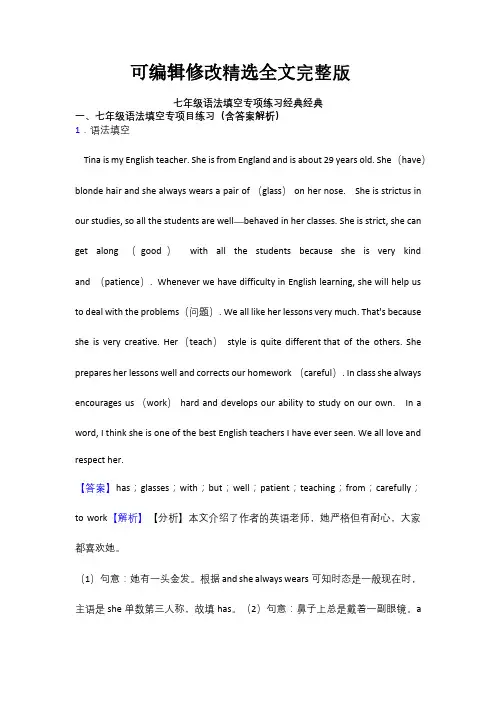
可编辑修改精选全文完整版七年级语法填空专项练习经典经典一、七年级语法填空专项目练习(含答案解析)1.语法填空Tina is my English teacher. She is from England and is about 29 years old. She(have)blonde hair and she always wears a pair of (glass) on her nose. She is strictus in our studies, so all the students are well—behaved in her classes. She is strict, she can get along (good)with all the students because she is very kind and (patience). Whenever we have difficulty in English learning, she will help us to deal with the problems(问题). We all like her lessons very much. That's because she is very creative. Her(teach)style is quite different that of the others. She prepares her lessons well and corrects our homework (careful). In class she always encourages us (work) hard and develops our ability to study on our own. In a word, I think she is one of the best English teachers I have ever seen. We all love and respect her.【答案】has;glasses;with;but;well;patient;teaching;from;carefully;to work【解析】【分析】本文介绍了作者的英语老师,她严格但有耐心,大家都喜欢她。
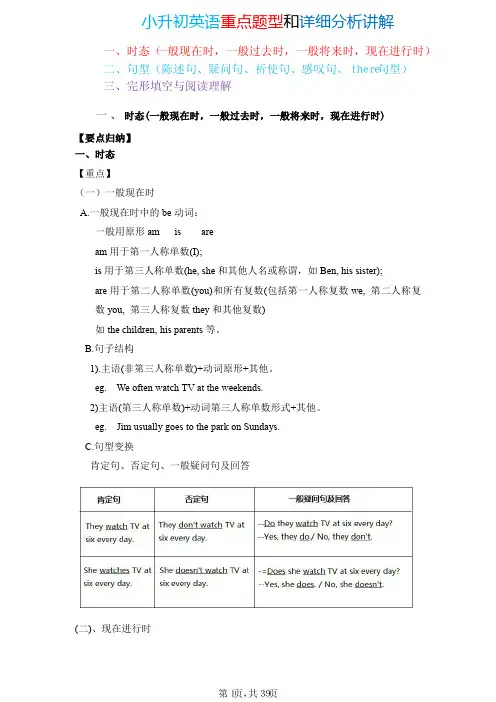
小升初英语重点题型和详细分析讲解一、时态(一般现在时,一般过去时,一般将来时,现在进行时)二、句型(陈述句、疑问句、祈使句、感叹句、there句型)三、完形填空与阅读理解【要点归纳】一、时态【重点】(一)一般现在时A.一般现在时中的be 动词:一般用原形amisaream 用于第一人称单数(I);is 用于第三人称单数(he,she 和其他人名或称谓,如Ben,his sister);are 用于第二人称单数(you)和所有复数(包括第一人称复数we,第二人称复数you,第三人称复数they 和其他复数)如the children,his parents 等。
B.句子结构1).主语(非第三人称单数)+动词原形+其他。
eg.We often watch TV at the weekends.2)主语(第三人称单数)+动词第三人称单数形式+其他。
eg.Jim usually goes to the park on Sundays.C.句型变换肯定句、否定句、一般疑问句及回答(二)、现在进行时一、时态(一般现在时,一般过去时,一般将来时,现在进行时)A.构成形式:主语+be动词+动词的ing形式+其他。
这里强调一点,两者缺少其中任何一种都不可以构成现在进行时。
B.现在进行时表示动作正在进行或事情正在发生。
C.句型变换:(三)、一般过去时A.一般过去时中的be动词一般用过去式:was werewas用于第一人称单数(I)和第三人称单数(he,she和其他人名或称谓,如Ben, his sister等)were用于第二人称单数(you)和所有复数(包括第一人称复数we,第二人称复数you,第三人称复数they和其他复数,如the children,his parents等)。
B.构成形式:主语+动词的过去式+其他。
注意:没有be动词的否定句和疑问句中,用didn’t否定和用did提问后,动词在定要用原形。

初中英语完形填空-word文档恰当词语填空1.阅读下面短文,在空白处填入一个适当的词,或填入括号中所给单词的正确形式(最多限填3个单词).Long long ago, there was a small village in the Middle East. In the village there was ____1____ old man called Sthira. He lived by himself. His only son had gone far away to study. Sthira’s friends ____2____ (wonder) whether his son would return, ____3____ Sthira always said,” Whatever happens, happens for good.”One day the old man’s son returned and the villages were very happy for Sthira. He thanked the villagers and said ____4____ (polite),”Whatever happens, happens for good.” However, later, Sthira’s son broke his ____5____. Once again the villagers came to visit him and once again the old man thanked ____6____ (they) and said, “Whatever happens, happens for good. ”Some of the villagers were surprised ____7____ (hear) this. Why? What was good? His son’s leg got badly hurt!After a few days, the army came to the village and forced all the young men to ____8____ the army. When they found his son had a ____9____ (break) leg, they left him behind. Once again, all the villagers came toto buy the land. You have to pay for other things. There is no ________ you could ever do it." Then the teacher added, "____8____ you rewrite this paper with a more realistic goal, I'll reconsider your grade. "The boy went home and thought about it long and hard. He asked his father what he should do. His father said, "Look, son, you have to make up your own mind on this. But I think it is a very important ____9____ for you."Finally, after thinking about it for several days, the boy handed in the same paper, making ____10____ changes at all. He said to the teacher, "You can keep the 'F' and I'll keep my dream. "1. A. speech B. notice C. paperD. diary2. A. own B. win C. paint D. sell3. A. just B. even C. ever D. almost4. A. dream B. heart C. adviceD. trust5. A. by B. in C. to D. with6. A. time B. money C. space D.work7. A. way B. wonder C. problemD. matter8. A. Though B. Since C. UnlessD. If9. A. change B. gift C. decisionD. message10. A. no B. anything C. any D. nothing3. 完形填空Few people like changing their habits, good or bad. Whether it is smoking, drinking or over-eating, they ____1____ "enjoying" them to the end.On every packet of cigarettes(香烟), people are warned against the ____2____ of smoking: "Warning: Cigarette Smoking Is Dangerous to Your Health". ____3____, millions of them start smoking or go on smoking. Why?Facts show that families and surroundings(环境) play a very important part in ____4____ smokers. All those smokers come from smoking families or have smoking ____5____ or relatives. Films and TV plays alsoplay a part. People ____6____ their "heroes" on TV drinking alcohol(酒) or smoking cigarettes. "Heroes" seem to fear ____7____, neither killing themselves nor killing others with alcohol and cigarettes. If they are not afraid of the harm of smoking and drinking, ____8____ should common people be afraid?The simple warning on the cigarette packet does not influence smokers' habits. Even ____9____ warnings, like showing pictures of smokers who have died of cancer, don't seem to work.Knowing and believing seem to be two ____10____ things. If smoking is really as harmful as doctors say, it is time for smokers to think about it and try to give it up! 1. A. stop B. continue C. finish D. avoid2. A. chances B. excuses C. causesD. dangers3. A. Moreover B. Also C. HoweverD. Otherwise4. A. influencing B. explaining C. improving D. describing5. A. parents B. uncles C. brothersD. friends6. A. hear B. catch C. watch D. face7. A. something B. nothing C. anythingD. everything8. A. what B. how C. when D. why9. A. stronger B. worse C. longerD. harder10. A. similar B. pleasant C. differentD. boring选词填空4. 选择恰当的单词填空。
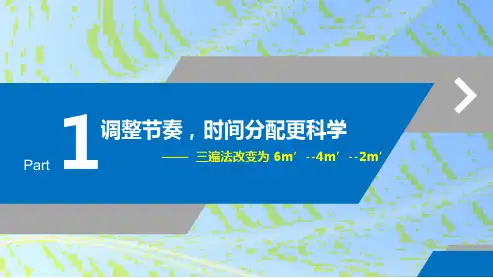
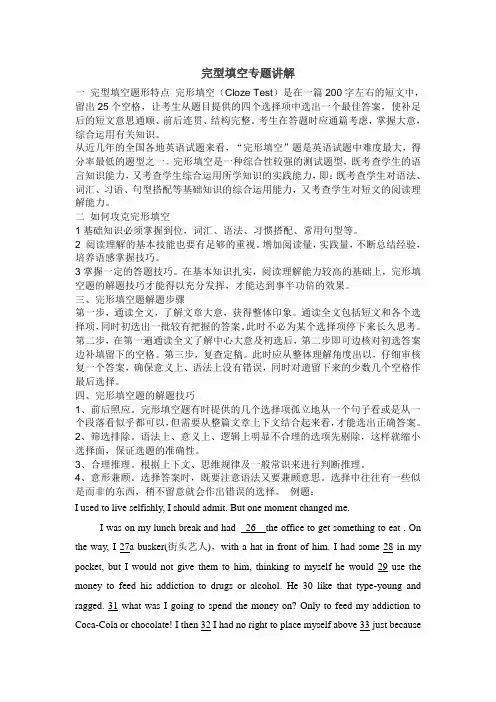
完型填空专题讲解一完型填空题形特点完形填空(Cloze Test)是在一篇200字左右的短文中,留出25个空格,让考生从题目提供的四个选择项中选出一个最佳答案,使补足后的短文意思通顺、前后连贯、结构完整。
考生在答题时应通篇考虑,掌握大意,综合运用有关知识。
从近几年的全国各地英语试题来看,“完形填空”题是英语试题中难度最大,得分率最低的题型之一。
完形填空是一种综合性较强的测试题型,既考查学生的语言知识能力,又考查学生综合运用所学知识的实践能力,即:既考查学生对语法、词汇、习语、句型搭配等基础知识的综合运用能力,又考查学生对短文的阅读理解能力。
二如何攻克完形填空1基础知识必须掌握到位,词汇、语法、习惯搭配、常用句型等。
2 阅读理解的基本技能也要有足够的重视。
增加阅读量,实践量,不断总结经验,培养语感掌握技巧。
3掌握一定的答题技巧。
在基本知识扎实,阅读理解能力较高的基础上,完形填空题的解题技巧才能得以充分发挥,才能达到事半功倍的效果。
三、完形填空题解题步骤第一步,通读全文,了解文章大意,获得整体印象。
通读全文包括短文和各个选择项,同时初选出一批较有把握的答案。
此时不必为某个选择项停下来长久思考。
第二步,在第一遍通读全文了解中心大意及初选后,第二步即可边核对初选答案边补填留下的空格。
第三步,复查定稿。
此时应从整体理解角度出以,仔细审核复一个答案,确保意义上、语法上没有错误,同时对遗留下来的少数几个空格作最后选择。
四、完形填空题的解题技巧1、前后照应。
完形填空题有时提供的几个选择项孤立地从一个句子看或是从一个段落看似乎都可以,但需要从整篇文章上下文结合起来看,才能选出正确答案。
2、筛选排除。
语法上、意义上、逻辑上明显不合理的选项先剔除,这样就缩小选择面,保证选题的准确性。
3、合理推理。
根据上下文、思维规律及一般常识来进行判断推理。
4、意形兼顾。
选择答案时,既要注意语法又要兼顾意思。
选择中往往有一些似是而非的东西,稍不留意就会作出错误的选择。
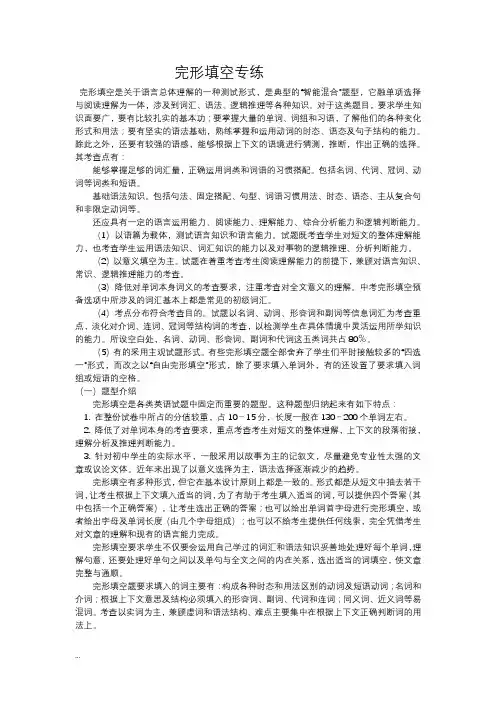
完形填空专练完形填空是关于语言总体理解的一种测试形式,是典型的“智能混合”题型,它融单项选择与阅读理解为一体,涉及到词汇、语法、逻辑推理等各种知识。
对于这类题目,要求学生知识面要广,要有比较扎实的基本功;要掌握大量的单词、词组和习语,了解他们的各种变化形式和用法;要有坚实的语法基础,熟练掌握和运用动词的时态、语态及句子结构的能力。
除此之外,还要有较强的语感,能够根据上下文的语境进行猜测,推断,作出正确的选择。
其考查点有:能够掌握足够的词汇量,正确运用词类和词语的习惯搭配。
包括名词、代词、冠词、动词等词类和短语。
基础语法知识。
包括句法、固定搭配、句型、词语习惯用法、时态、语态、主从复合句和非限定动词等。
还应具有一定的语言运用能力、阅读能力、理解能力、综合分析能力和逻辑判断能力。
(1)以语篇为载体,测试语言知识和语言能力。
试题既考查学生对短文的整体理解能力,也考查学生运用语法知识、词汇知识的能力以及对事物的逻辑推理、分析判断能力。
(2)以意义填空为主。
试题在着重考查考生阅读理解能力的前提下,兼顾对语言知识、常识、逻辑推理能力的考查。
(3)降低对单词本身词义的考查要求,注重考查对全文意义的理解。
中考完形填空预备选项中所涉及的词汇基本上都是常见的初级词汇。
(4)考点分布符合考查目的。
试题以名词、动词、形容词和副词等信息词汇为考查重点,淡化对介词、连词、冠词等结构词的考查,以检测学生在具体情境中灵活运用所学知识的能力。
所设空白处,名词、动词、形容词、副词和代词这五类词共占80%。
(5)有的采用主观试题形式。
有些完形填空题全部舍弃了学生们平时接触较多的“四选一”形式,而改之以“自由完形填空”形式,除了要求填入单词外,有的还设置了要求填入词组或短语的空格。
(一)题型介绍完形填空是各类英语试题中固定而重要的题型。
这种题型归纳起来有如下特点:1. 在整份试卷中所占的分值较重,占10-15分,长度一般在130-200个单词左右。
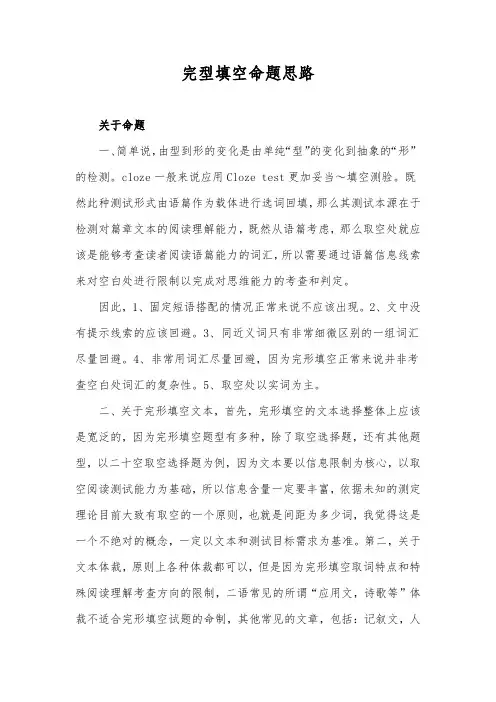
完型填空命题思路关于命题一、简单说,由型到形的变化是由单纯“型”的变化到抽象的“形”的检测。
cloze一般来说应用Cloze test更加妥当~填空测验。
既然此种测试形式由语篇作为载体进行选词回填,那么其测试本源在于检测对篇章文本的阅读理解能力,既然从语篇考虑,那么取空处就应该是能够考查读者阅读语篇能力的词汇,所以需要通过语篇信息线索来对空白处进行限制以完成对思维能力的考查和判定。
因此,1、固定短语搭配的情况正常来说不应该出现。
2、文中没有提示线索的应该回避。
3、同近义词只有非常细微区别的一组词汇尽量回避。
4、非常用词汇尽量回避,因为完形填空正常来说并非考查空白处词汇的复杂性。
5、取空处以实词为主。
二、关于完形填空文本,首先,完形填空的文本选择整体上应该是宽泛的,因为完形填空题型有多种,除了取空选择题,还有其他题型,以二十空取空选择题为例,因为文本要以信息限制为核心,以取空阅读测试能力为基础,所以信息含量一定要丰富,依据未知的测定理论目前大致有取空的一个原则,也就是间距为多少词,我觉得这是一个不绝对的概念,一定以文本和测试目标需求为基准。
第二,关于文本体裁,原则上各种体裁都可以,但是因为完形填空取词特点和特殊阅读理解考查方向的限制,二语常见的所谓“应用文,诗歌等”体裁不适合完形填空试题的命制,其他常见的文章,包括:记叙文,人物传记,夹叙夹议文,各类说明文,论说文等等都可以取材。
大学段逐渐淘汰完形填空测试题,鲜有专家对此作出测试学意义上的分析,或者仅仅是题型调整而已,或者因为对于完形填空大学四六级测试的定位不是很清晰,也或者此题型的命题和评价效果遭遇尴尬……。
高考当中此题型目前还在沿用,但文本以记叙文为主,目的是为了迎合命题方向吧。
近几年的完形填空高考题大多选择了记叙文体裁,原来偶然出现的说明文和论说文基本淡出了。
原因大约因为记叙文的时间地点人物事件等要素会使得文章整体信息含量比较多,取词后文章从篇章信息角度看会有诸多阅读提示和限制,符合对完形填空测试的命题目标要求,整体上题目的命制会比较稳妥,不容易出现“偏差”,而事实上仅仅依靠一篇记叙文是不能够检测出取空选择回填的阅读理解能力的,而且无形中在导向上形成一种定势,那就是完形填空是记叙文体裁,其他体裁不需要关注太多,在以考试为重要导向的环境中,必然形成了引导式的完形填空题的真正评价反拨作用的缺失。

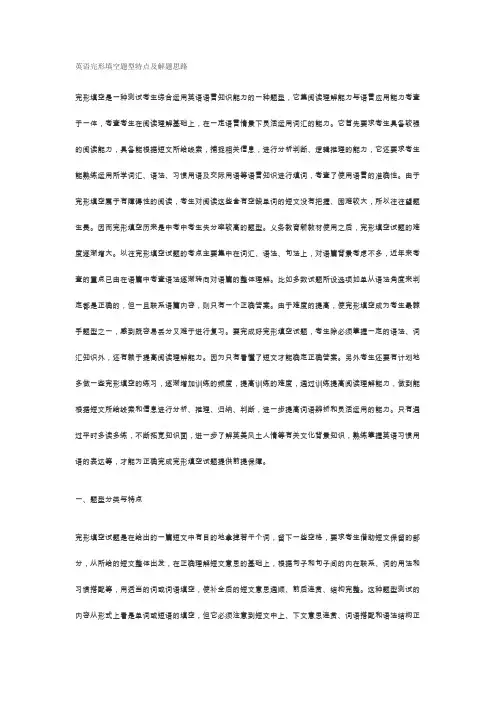
英语完形填空题型特点及解题思路完形填空是一种测试考生综合运用英语语言知识能力的一种题型,它集阅读理解能力与语言应用能力考查于一体,考查考生在阅读理解基础上,在一定语言情景下灵活运用词汇的能力。
它首先要求考生具备较强的阅读能力,具备能根据短文所给线索,捕捉相关信息,进行分析判断、逻辑推理的能力,它还要求考生能熟练运用所学词汇、语法、习惯用语及交际用语等语言知识进行填词,考查了使用语言的准确性。
由于完形填空属于有障碍性的阅读,考生对阅读这些含有空缺单词的短文没有把握、困难较大,所以往往望题生畏。
因而完形填空历来是中考中考生失分率较高的题型。
义务教育新教材使用之后,完形填空试题的难度逐渐增大。
以往完形填空试题的考点主要集中在词汇、语法、句法上,对语篇背景考虑不多,近年来考查的重点已由在语篇中考查语法逐渐转向对语篇的整体理解。
比如多数试题所设选项如单从语法角度来判定都是正确的,但一旦联系语篇内容,则只有一个正确答案。
由于难度的提高,使完形填空成为考生最棘手题型之一,感到既容易丢分又难于进行复习。
要完成好完形填空试题,考生除必须掌握一定的语法、词汇知识外,还有赖于提高阅读理解能力。
因为只有看懂了短文才能确定正确答案。
另外考生还要有计划地多做一些完形填空的练习,逐渐增加训练的频度,提高训练的难度,通过训练提高阅读理解能力,做到能根据短文所给线索和信息进行分析、推理、归纳、判断,进一步提高词语辨析和灵活运用的能力。
只有通过平时多读多练,不断拓宽知识面,进一步了解英美风土人情等有关文化背景知识,熟练掌握英语习惯用语的表达等,才能为正确完成完形填空试题提供前提保障。
一、题型分类与特点完形填空试题是在给出的一篇短文中有目的地拿掉若干个词,留下一些空格,要求考生借助短文保留的部分,从所给的短文整体出发,在正确理解短文意思的基础上,根据句子和句子间的内在联系、词的用法和习惯搭配等,用适当的词或词语填空,使补全后的短文意思通顺、前后连贯、结构完整。
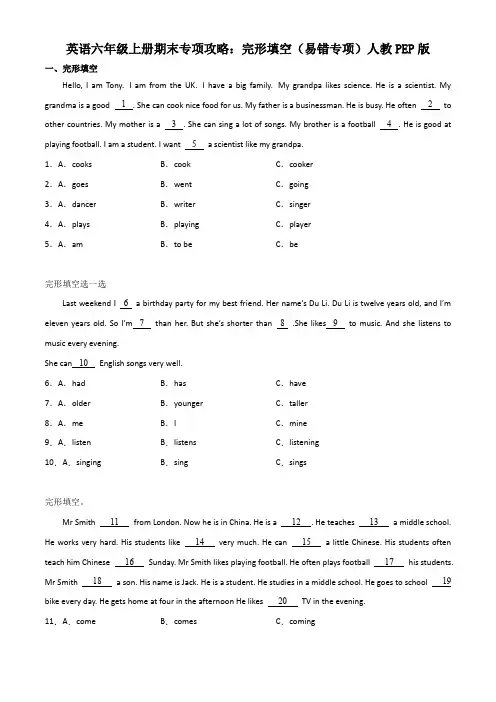
英语六年级上册期末专项攻略:完形填空(易错专项)人教PEP版一、完形填空Hello, I am Tony.I am from the UK.I have a big family.My grandpa likes science. He is a scientist. My12.A.teacher B.worker C.farmer13.A.on B.in C.to14.A.he B.him C.her15.A.say B.talk C.speak16.A.at B.of C.on17.A.with B.for C.to18.A.has B.have C.there is19.A.on B.by C.in20.A.seeing B.looking C.watchingA dog has large piece of meat in his mouth. When he is 21 on a small bridge, he looks down and 22 himself in the water. He thinks it is another dog. That dog has also a large piece of meat in his mouth. He says to himself, “I want to 23 his meat. Then I can have 24 pieces of meat. He opens his mouth to bark (吠叫) the dog in the water, and his meat falls into 25 .21.A.walk B.walks C.walking22.A.see B.sees C.seeing23.A.get B.gets C.getting24.A.one B.two C.three25.A.bridge B.mouth C.water完形填空。

1Most people have no idea of the hard work and worry that goes into the collecting of those fascinating birds and animals that they pay to see in the zoo. One of the questions that is always asked of me is (1) I became an animal collector in the first (2). The answer is that I have always been interested in animals and zoos. According to my parents, the first word I was able to say with any (3) was not the conventional ―mamma‖ or ―daddy‖, (4) the word ―zoo‖, which I would (5) over and over again with a shrill (6) until someone, in groups to (7) me up, would take me to the zoo. When I (8) a little older, we lived in Greece and I had a great (9) of pets, ranging from owls to seahorses, and I spent all my spare time (10) the countryside in search of fresh specimens to (11) to my collection of pets. (12) on I went for a year to the City Zoo, as a student (13) , to get experience of the large animals, such as lions, bears, bison and ostriches, (14) were not easy to keep at home. When I left, I (15) had enough money of my own to be able to (16) my first trip and I have been going (17) ever since then. Though a collector's job is not an easy one and is full of (18), it is certainly a job which will appeal (19) all those who love animals and (20) .1.A.how B. where C. when D. whether2.A.region B. field C. place D. case3.A.clarity B. emotion C. sentiment D. affection4.A.except B. but C. except for D. but for5.A.recite B. recognize C. read D. repeat6.A.volume B. noise C. voice D. pitch7.A.close B. shut C. stop D. comfort8.A.grew B. was growing C. grow D. grown9.A.many B. amount C. number D. supply10.A.living B. cultivating C. reclaiming D. exploring11.A.increase B. include C. add D. enrichter B. further C. then D. subsequently13.A.attendant B. keeper C. member D. aide14.A.who B. they C. of which D. which15.A.luckily B. gladly C. nearly D. successfully16.A.pay B. provide C. allow D. finance17.A.normally B. regularly C. usually D. often18.A.expectations B. sorrows C. excitement D. disappointments19.A.for B. with C. to D. from20.A.excursion B. travel C. journey D. Trip2If you were to begin a new job tomorrow, you would bring with you some basic strengths and weaknesses. Success or (1) in your work would depend, to (2) great extent, (3) your ability to use your strengths and weaknesses to the best advantage. (4) the utmost importance is your attitude. A person (5) begins a job convinced that he isn't going to like it or is (6) that he is going to ail is exhibiting a weakness which can only hinder his success. On the other hand, a person who is secure (7) his belief that he is probably as capable (8) doing the work as anyone else and who is willing to make a cheerful attempt (9) it possesses a certain strength of purpose. The chances are that he will do well.(10) the prerequisite skills for a particular job is strength. Lacking those skills is obviously a weakness. A book-keeper who can't add or a carpenter who can't cut a straight line with a saw (11) hopeless cases.This book has been designed to help you capitalize (12) the strength and overcome the (13) that you bring to the job of learning. But insgroupsto measure your development, you must first (14) -- stock of swheres you stand now.(15) -- we get further along in the book, we’ll be (16) -- in some detail with specific processes for developing and strengthening (17) -- skills. However, (18) -- begin with, you should pause (19) -- examine your present strengths and weaknesses in three areas that are critical to your success or failure in school: your (20) --, your reading andcommunication skills, and your study habits.1.A.improvement B. victory C. failure D. achievement2.A.a B. the C. some D. certain3.A.in B. on C. of D. to4.A.Out of B. Of C. To D. Into5.A.who B. what C. that D. which6.A.ensure B. certain C. sure D. surely7.A.onto B. on C. off D. in8.A.to B. at C. of D. for9.A.near B. on C. by D. at10.A.Have B. Had C. Having D. Had been11.A.being B. been C. are D. is12.A.except B. but C. for D. on13.A.idea B. weakness C. strength D. advantage14.A.make B. take C. do D. give15.A.as B. till C. over D. out16.A.deal B. dealt C. be dealt D. dealing17.A.learnt B. learned C. learning D. learn18.A.around B. to C. from D. beside19.A.to B. onto C. into D. with20.A.intelligence B. work C. attitude D. weakness3Who won the World Cup 1994 football game? What happened at the United Nations? How did the critics like the new play? (1) -- an event takes place, newspapers are on the streets (2) -- the details. Wherever anything happens in the world, reports are on the spot to (3) -- the news.Newspapers have one basic (4) --, to get the news as quickly as possible from its source, from those who make it to those who want to (5) -- it. Radio, telegraph, television, and 6 inventions brought competition for newspapers. So did the development of magazines and other means of communication. (7) --, this competition merely spurred the newspapers on. They quickly made use of the newer and faster means of communication to improve the (8) -- and thus the efficiency of their own operations. Today more newspapers are (9) -- and read than ever before. Competition also led newspapers to branch outsintos many other fields. Besides keeping readers (10) -- of the latest news, today's newspapers (11) -- and influence readers about politics and other important and serious matters. Newspapers influence readers' economic choices (12) -- advertising. Most newspapers depend on advertising for their very (13) --. Newspapers are sold at a price that (14) -- even a small fraction of the cost of production. The main (15) -- of income for most newspapers is commercial advertising. The (16) -- in selling advertising depends on a newspaper's value to advertisers. This (17) -- in terms of circulation. How many people read the newspaper? Circulation depends (18) -- on the work of the circulation department and on the services or entertainment (19) -- in a newspaper's pages. But for the most part, circulation depends on a newspaper's value to readers as a source of information (20) -- the community, city, country, state, nation, and world—and even outer space.1.A.Just when B. While C. Soon after D. Before2.A.to give B. giving C. given D. being given3.A.gather B. spread C. carry D. bring4.A.reason B. cause C. problem D. purpose5.A.make B. publish C. know D. write6.A.another B. other C. one another D. the other7.A.However B. And C. Therefore D. So8.A.value B. ratio C. rate D. speed9.A.spread B. passed C. printed D. completedrm B. be informed C. to be informed D. informed11.A.entertain B. encourage C. educate D. edit12.A.on B. through C. with D. of13.A.forms B. existence C. contents D. purpose14.A.tries to cover B. manages to coverC. fails to coverD. succeeds in15.A.source B. origin C. course D. finance16.A.way B. means C. chance D. success17.A.measures B. measured C. Is measured D. was measured18.A.somewhat B. little C. much D. something19.A.offering B. offered C. which offered D. to be offered20.A.by B. with C. at D. about4For many people today, reading is no longer relaxation. To keep up their work they must read letters, reports, trade publications, interoffice communications, not to mention newspapers and magazines: a never-ending flood of words. In (1) -- a job or advancing in one, the ability to read and comprehend (2) -- can mean the difference between success and failure. Yet the unfortunate fact is that most of us are (3) -- readers. Most of us develop poor reading (4) -- at an early age, and never get over them. The main deficiency (5) -- in the actual stuff of language itself-words. Taken individually, words have (6) -- meaning until they are strung together into phrased, sentences and paragraphs. (7) --, however, the untrained reader does not read groups of words. He laboriously reads one word at a time, often regressing to (8) -- words or passages. Regression, the tendency to look back over (9) -- you have just read, is a common bad habit in reading. Another habit which (10) -- down the speed of reading is vocalization - sounding each word either orally or mentally as (11) -- reads.To overcome these bad habits, some reading clinics use a device called an (12), which moves a bar (or curtain) down the page at a predetermined speed. The bar is set at a slightly faster rate (13) -- the reader finds comfortable, in order to ―stretch‖him. The accelerator forces the reader to read fast, (14) -- word-by-word reading, regression and subvocalization, practically impossible. At first (15) -- is sacrificed for speed. But when you learn to read ideas and concepts, you will not only read faster, (16) -- your comprehension will improve. Many people have found (17) -- reading skill drastically improved after some training. (18) -- Charlce Au, a business manager, for instance, his reading rate was a reasonably good 172 words a minute (19) -- the training, now it is an excellent 1,378 words a minute. He is delighted that how he can (20) -- a lot more reading material in a short period of time.1.A.applying B. doing C. offering D. getting2.A.quickly B. easily C. roughly D. decidedly3.A.good B. curious C. poor D. urgent4.A.training B. habits C. situations D. custom5.A.lies B. combines C. touches D. involves6.A.some B.A lot C. little D. dull7.A.Fortunately B. In fact C. Logically D. Unfortunately8.A.reuse B. reread C. rewrite D. recite9.A.what B. which C. that D. if10.A.scales B. cuts C. slows D. measures11.A.some one B. one C. he D. reader12.A.accelerator B. actor C. amplifier D. observer13.A.then B. as C. beyond D. than14.A.enabling B. leading C. making D. indicating15.A.meaning B. comprehension C. gist D. regression16.A.but B. nor C. or D. for17.A.our B. your C. their D. such a18.A.Look at B. Take C. Make D. Consider19.A.for B. in C. after D. before20.A.master B. go over C. present D. get through5Many students find the experience of attending university lectures to be a confusing and frustrating experience. The lecturer speaks for one or two hours, perhaps (1) -- the talk with slides, writing up important information on the blackboard, (2) -- reading material and giving out (3) -- .The new student sees the other students continuously writing on notebooks and (4) -- what to write. Very often the student leaves the lecture (5) -- notes which do not catch the main points and (6) -- become hard even for the (7) -- to understand.Most institutions provide courses which (8) -- new students to develop the skills they need to be (9) -- listeners and note-takers. (10) -- these are unavailable, there are many useful study-skills guides which (11) -- learners to practice these skills (12) -- .In all cases it is important to (13) -- the problem (14) -- actually starting your studies.It is important to (15) -- that most students have difficulty in acquiring the language skills (16) -- in college study. One way of (17) -- these difficulties is to attend the language and study - skills classes which most institutions provide throughout the (18) -- year. Another basic (19) -- is to find a study partner (20) -- it is possible to identify difficulties, exchange ideas and provide support.1.A.extending B. illustrating C. performing D. conducting2.A.attributing B. contributing C. distributing D. explaining3.A.assignments B. information C. content D. definition4.A.suspects B. understands C. wonders D. convinces5.A.without B. with C. on D. except6.A.what B. those C. as D. which7.A.teachers B. classmates C. partners D. students8.A.prevent B. require C. assist D. forbid9.A.effective B. passive C. relative D. expressive10.A.Because B. Though C. Whether D. If11.A.enable B. stimulate C. advocate D. prevent12.A.independently B. repeatedly C. logically D. generally13.A.evaluate B. acquaint C. tackle D. formulate14.A.before B. after C. while D. for15.A.predict B. acknowledge C. argue D. ignore16.A.to require B. required C. requiring D. are required17.A.preventing B. withstanding C. sustaining D. overcoming18.A.average B. ordinary C. normal D. academic19.A.statement B. strategy C. situation D. suggestion20.A.in that B. for which C. with whom D. such as6From childhood to old age, we all use language as a means of broadening our knowledge of ourselves and the world about us. When humans first (1)--, they were like newborn children, unable to use this (2) -- tool. Yet once language developed, the possibilities for human kind’s future (3) -- and cultural growth increased.Many linguists believe that evolution is (4) -- for our ability to produce and use language. They (5) -- that our highly evolved brain provides us (6) -- an innate language ability not found in lower (7) --. Proponents of thisinnateness theory say that our (8) -- for language is inborn, but that language itself develops gradually, (9) -- a function of the growth of the brain during childhood. Therefore there are critical (10) -- times for language development.Current (11) -- of innateness theory are mixed, however, evidence supporting the existence of some innate abilities is undeniable. (12) --, more and more schools are discovering that foreign languages are best taught in (13) -- grades. Young children often can learn several languages by being (14) -- to them, while adults have a much harder time learning another language once the (15) -- of their first language have become firmly fixed.(16) -- some aspects of language are undeniably innate, language does not develop automatically in a vacuum. Children who have been (17) -- from other human beings do not possess language. This demonstrates that (18) -- with other human beings is necessary for proper language development. Some linguists believe that this is even more basic to human language (19) -- than any innate capacities. These theorists view language as imitative, learned behavior. (20) --, children learn language from their parents by imitating them. Parents gradually shape their child's language skills by positively reinforcing precise imitations and negatively reinforcing imprecise ones.1.A.generated B. evolved C. born D. originated2.A.valuable B. appropriate C. convenient D. favorite3.A.attainments B. feasibility C. entertainments D. evolution4.A.essential B. available C. reliable D. responsible5.A.confirm B. inform C. claim D. convince6.A.for B. from C. of D. withanizations B. organisms C. humans D. children8.A.potential B. performance C. preference D. passion9.A.as B. just as C. like D. unlike10.A.ideological B. biological C. social D. psychological11.A.reviews B. reference C. reaction D. recommendation12.A.In a word B. In a sense C. Indeed D. In other words13.A.various B. different C. the higher D. the lower14.A.revealed B. exposed C. engaged D. involved15.A.regulations B. formations C. rules D. constitutions16.A.Although B. Whether C. Since D. When17.A.distinguished B. different C. protected D. isolated18.A.exposition B. comparison C. contrast D. interaction19.A.acquisition B. appreciation C. requirement D. alternative20.A.As a result B. After all C. In other words D. Above all7Shopping habits in the United States have changed greatly in the last quarter of the 20th century. (1) -- in the 1900s most American towns and cities had a Main Street. Main Street was always in the heart of a town. This street was (2) -- on both sides with many (3) -- businesses. Here, shoppers walked into stores to look at all sorts of merchandise: clothing, furniture, hardware, groceries. (4) --, some shops offered (5) --.These shops included drugstores, restaurants, shoe-repair stores, and barber or hairdressing shops. (6) -- in the 1950s, a change began to (7) --.Too many automobiles had crowded into Main Street (8) -- too few parking places were (9) -- shoppers. Because the streets were crowded, merchants began to look with interest at the open spaces (10) -- the city limits. Open space is what their car-driving customers needed. And open space is what they got (11) -- the first shopping centre was built. Shopping centres, or rather malls, (12) -- as a collection of small new stores (13) -- crowded city centres. (14) -- by hundreds of free parking space, customers were drawn away from (15) -- areas to outlying malls. And the growing (16) -- of shopping centres led (17) -- to the building of bigger and better-stocked stores. (18) -- the late 1970s, many shopping malls had almost developed into small cities themselves. In addition to providing the(19) -- of one-stop shopping, malls were transformed into landscaped parks, (20) -- benches, fountains, and outdoor entertainment.1.A.As early as B. Early C. Early as D. Earlier2.A.built B. designed C. intended D. lined3.A.varied B. various C. sorted D. mixed-up4.A.Apart from B. However C. In addition D. As well5.A.medical care B. food C. cosmetics D. services6.A.suddenly B. Abruptly C. Contrarily D. But7.A.be taking place B. take place C. be taken place D. have taken place8.A.while B. yet C. though D. and then9.A.available for B. available to C. used by D. ready for10.A.over B. from C. out of D. outside11.A.when B. while C. since D. then12.A.started B. founded C. set up D. organized13.A.out of B. away from C. next to D. near14.A.Attracted B. Surprised C. Delighted D. Enjoyed15.A.inner B. central C. shopping D. downtown16.A.distinction B. fame C. popularity D. liking17.A.on B. in turn C. by turns D. further18.A.By B. During C. In D. Towards19.A.cheapness B. readiness C. convenience D. handiness20.A.because of B. and C. with D. provided8Music comes in many forms; most countries have a style of their own. (1) -- the turn of the century when jazz was born, America had no prominent (2) – of its own. No one knows exactly when jazz was (3) --, or by whom. But it began to be (4) -- in the early 1900s.Jazz is America’s contribution to (5) -- music. In contrast to classical music, which (6) -- formal European traditions, jazz is spontaneous and free-form. It bubbles with energy, (7) -- the moods, interests, and emotions of the people. In the 1920s jazz (8) -- like America, and (9) -- it does today. The (10) of this music are as interesting as the music (11) --. American Negroes, or blacks, as they are called today, were the jazz (12) --. They were brought to Southern States (13) -- slaves. They were sold to plantation owners and forced to work long (14) --. When a Negro died his friend and relatives (15) -- a procession to carry the body to the cemetery. In New Orleans, a band often accompanied the (16) --. On the way to the cemetery the band played slow, solemn music suited to the occasion. (17) -- on the way home the mood changed. Spirits lifted. Death had removed one of their(18) --, but the living were glad to be alive. The band played (19) -- music, improvising (即兴表演) on both the harmony and the melody of the tunes (20) -- at the funeral. This music made everyone want to dance. It was an early form of jazz.1.A.By B. At C. In D. On2.A.music B. song C. melody D. style3.A.discovered B. acted C. invented D. designed4.A.noticed B. found C. listened D. heard5.A.classical B. sacred C. popular D. light6.A.forms B. follows C. approaches D. introduces7.A.expressing B. explaining C. exposing D. illustrating8.A.appeared B. felt C. seemed D. sounded9.A.as B. so C. either D. neither10.A.origins B. originals C. discoveries D. resources11.A.concerned B. itself C. available D. oneself12.A.players B. followers C. fans D. pioneers13.A.for B. as C. with D. by14.A.months B. weeks C. hours D. times15.A.demonstrated B. composed C. hosted D. formed16.A.demonstration B. procession C. body D. march17.A.Even B. Therefore C. Furthermore D. But18.A.number B. members C. body D. relations19.A.sad B. solemn C. happy D. funeral20.A.whistled B. sung C. presented D. showed9In every cultivated language there are two great classes of words which, taken together, comprise the whole vocabulary. First, there are those words (1) -- which we become acquainted in daily conversation, which we (2) --, that is to say, from the (3) -- of our own family and from our familiar associates, and (4) -- we should know and use (5) -- we could not read or write. They (6) -- the common things of life, and are the stock in trade of all who (7) -- the language. Such words may be called ―popular‖, since they belong to the people (8) -- and are not the exclusive (9) -- of a limited class. On the other hand, our language (10) -- a multitude of words which are comparatively (11) -- used in ordinary conversation. Their meanings are known to every educated person, but there is little (12) -- to use them at home or in the market-place. Our (13) -- acquaintance with them comes not from our mother's (14) -- or from the talk of our school-mates, (15) -- from books that we read, lectures that we (16) --, or the more (17) -- conversation of highly educated speakers who are discussing some particular (18) -- in a style appropriately elevated above the habitual (19) -- of everyday life. Such words are called ―learned‖, and the (20) -- between them and the ―popular‖ words is of great importance to a right understanding of linguistic process.1.A.at B. with C. by D. through2.A.study B. imitate C. stimulate D. learn3.A.mates B. relatives C. members D. fellows4.A.which B. that C. those D. ones5.A.even B. despite C. even if D. in spite of6.A.mind B. concern C. care D. involve7.A.hire B. apply C. adopt D. use8.A.in public B. at most C. at large D. at best9.A.right B. privilege C. share D. possession10.A.consists B. comprises C. constitutes D. composes11.A.seldom B. much C. never D. often12.A.prospect B. way C. reason D. necessity13.A.primary B. first C. principal D. prior14.A.tips B. mouth C. lips D. tongue15.A.besides B. and C. or D. but16.A.hear of B. attend C. hear from D. listen17.A.former B. formula C. formal D. formative18.A.theme B. topic C. idea D. point19.A.border B. link C. degree D. extent20.A.diversion B. distinction C. diversity D. similarity10Today the car is the most popular sort of transportation in all of the United States. It has completely 1 the horse as a 2 of everyday transportation. Americans use their car for 3 90% of all 4 business. Most Americans are able to 5 cars. The averageprice of a 6 made car was ,050 in 1950, ,470 in 1960 and up to ,750 7 1975.During this period American car manufacturers set about 8 their products and work efficiency. As a result, the yearly income of the 9 family increased from 1950 to 1975 10 than the price of cars. For this reason 11 a new car takes a smaller 12 of a family’s total earnings today. In 1951 13 it took 8.1 months of an average family’s 14 to buy a new car. In 1962 a new car 15 8.3 of a family’s annual earnings, by 1975 it only took 4.75 16 income. In addition, the 1975 cars were technically 17 to models from previous years. The 18 of automobile extends throughout the economy 19 the car is so important to American. Americans spend more money 20 keeping their cars running than on any other item.1.A.denied B. reproduced C. replaced D. ridiculed2.A.means B. mean C. types D. kinds3.A.hardly B. nearly C. certainly D. somehow4.A.personal B. personnel C. manual D. artificial5.A.buy B. sell C. race D. see6.A.quickly B. regularly C. rapidly D. recently7.A.on B.in C.before D.after8.A.raising B.making C.reducing D.improving9.A.unusual B.smallest C.average D.biggest10.A.slower B.equal C.faster D.less11.A.bringing B.obtain C.bought D.purchasing12.A.part B.half C.number D.quality13.A.clearly B.proportionally C.percentage D.suddenly14.A.income B.work C.plans D.debtsed B.spent C.cost D.needed16.A.month s B.year s C.family D.year17.A.famous B.superior C.fastest D.better18.A.running B.notice C.influence D.affect19.A.then B.as C.so D.which20.A.to B.in C.of D.for11We have spoken of marriage as a formal contract. It should be noted, however, that this contract does not 1 the same form in different societies. In Western societies, the 2 of a man and a woman 3 given the status of legal marriage by being registered by an official 4 by the state.In some African so cieties, 5 , marriage has nothing to do 6 an official registration of this kind but is legalized by the formal 7 of goods. Generally 8 is the bridegroom who is required to make a 9of goods to the bride's kin(亲戚), though sometimes a payment is 10 made by the bridegroom's kin to that of the bride. Among the Nuer, a 11 living in Southern Sudan, the payment made to the bride's kin, 12 as bridewealth, is in the 13 of cattle. Once the 14 of bridewealth is agreed 15 , and the formal payment is made, the marriage becomes a 16 union and the offspring of the union become the acceptable 17 of the husband.They remain 18 children even 19 the wife subsequently leaves him to live with 20 man.1.A.make B.get C.take D.do2.A.condition B.difference C.union D.divorce3.A.is B. are C.was D.were4.A.recognizing B.recognize C.to recognize D.recognized5.A.however B.yet C.though D.still6.A.with B.from C.for D.to7.A.exchange B.contact munication D.connection8.A.that B.this C.one D.it9.A.money B.payment C.cost D.consumption10.A.also B.too C.either D.as well11.A.a person B.a people C.a man D.a couple12.A.called B.known d D.looked13.A.shape B.size C.form D.type14.A.amount B.number C.figure D.volume15.A.upon B.with C.to D.for16.A.legal B.casual C.direct D.progressive17.A.bride B.cattle C.wealth D.children18.A.his B.her C.their D.one’s19.A.before B.because C.while D.if20.A.other B.another C.more D.farther12Many people wrongly believe that when people reach old age, their families place them in nursing homes. They are left in the 1 of strangers for the rest of their lives.Their 2 children visit them only occasionally,but more often, they do not have any 3 visitors.The truth is that this idea is an unfortunate myth-an 4 story. In fact, family members provide over 80 percent of the care 5 elderly people need. Samuel Prestoon, a sociologist, studied 6 the American family is changing. He reported that by the time the 7 American couple reaches 40 years of age, they have more parents than children. 8 , because people today live longer after an illness than people did years 9 , family members must provide long term care. More psychologists have found that all caregivers 10 a common characteristic: All caregivers believe that they are the best 11 for the job.In other words, they all felt that they 12 do the job better than anyone else.Social workers 13 caregivers to find out why they took 14 the responsibility of caring for an elderly relative.Many caregivers believed they had 15 to help their relative.Some stated that helping others 16 them feel more useful.Others hoped that by helping 17 now, they would deserve care when they became old and 18 .Caring for the elderlyand being taken care of can be a 19 satisfying experience for everyone who might be 20 .1.A.hands B.arms bodies D.homes2.A.growing B.grown C.being grown D.having grown3.A.constant sting C.regular D.normal4.A.imaginary B.imaginable C.imaginative D.imagery5.A.that B.this C.those D.these6.A.when B.how C.what D.wheremon B.ordinary C.standard D.average8.A.Further B.However C.Moreover D.Whereas9.A.before B.ago ter tely10.A.share B.enjoy C.divide D.consent11.A.person B.people C.character D.man12.A.would B.will C.could D.can13.A.questioned B.interviewed C.inquired D.interrogate14.A.in B.up C.on D.off15.A.admiration B.initiative C.necessity D.obligation16.A.cause B.enable C.make D.get17.A.someone B.anyone C.everyone D.anybody18.A.elderly B.dependent C.dependable D.independent19.A.similarly B.differently C.mutually D.certainly20.A.involved B.excluded C.included D.considered13Today, most countries in the world have canals.Many countries have built canals near the coast, and parallel 1 the coast.Even in the twentieth century, goods can be moved more cheaply by boat than by any other 2 of transport. These 3 make it。
短文填空技巧点拨一、题型概述短文填空相当于完形填空的一种变形,即将一篇短文中的若干个词抽出,要求考生在每个空格中填上一个词,使短文意思完整。
该题型是对考生综合能力的考查,包括阅读理解能力、基础语法能力、单词拼写能力和语言表达能力等。
根据近几年的中考题可发现,短文填空的文章主要以记叙文和议论文为主,一般设10-12个空,每空一词。
所填单词也多以实词为主,兼顾其它词性。
中考短文填空主要有以下五种形式:1.选词或词组填空; 2.根据首字母填词; 3.用所给单词的正确形式填空; 4.根据汉语提示填词; 5.根据上下文填词。
二、题型考查点1. 考查词性、词形的转换。
这一考点通常占较大比重,集中在考查动词的时态及语态、形容词和副词的比较级和最高级、名词的单复数等知识点。
因此,这就要求考生首先要理解短文的主旨大意,弄清语法、句子的结构等问题。
2. 考查固定搭配。
对于这类题目,我们平时要注重固定搭配的积累,比如习惯用语中的介词、固定句法中的连词等。
3. 考查关联词。
关联词连接两个或更多的分句,反映了句子之间的关系。
它们在句中虽不是主要成分,但起着衔接和连贯的作用。
关联词的选择主要取决于考生对上下文的理解。
4. 考查推断能力。
该考点侧重考查考生对整个篇章的把控能力,能根据已有的信息进行适当的推断,做出正确的判断。
三、解题步骤1. 跳过空格,通读短文,了解大意。
在做题时,要跳过空缺处,快速阅读全文,注意找出关键词,从整体上把握全文大意。
要注重对短文首句的理解,善于以首句的时态、语气为立足点,理清文脉,推测文章主题。
如果是选词填空题型,先浏览所给单词或短语,弄清楚所给单词的词性、意思。
2. 精心解题,确定语义,边读边做。
认真复读短文,确定空格处所需词语的意义;再根据空格在句中的位置,判断其在句中充当的成分,从而确定所填词的词性;然后再依据词语搭配和语法规则,判断所填的词的正确形式。
做题时,要先易后难,首先选出那些根据上下文能确定的答案,比如固定词组、句型或常见的语法结构等。
大学英语六级选词填空应试技巧——胡一、了解题型选词填空又称15选10,在仔细阅读部分,是新增题型;试题文章长约200到250个单词,10个空格,备选词汇共15个,每个空格只准选用一个单词,每个词不能重复使用;备选词汇是名词,动词,形容词和副词,虚词不在考核范围内;二、应试方法及步骤1、按照词缀准确判断15个单词的词性,将同一词性的备选单词归为一组,如果遇到动词还可以按照时态进行第二次分类,尽量将15个单词的类别分得越细越好;2、只读试题所在的原句,通过前后词判断空内应填入词性和语法属性,通过上下句判断时态,回到相对应的词性组选择单词,如果遇到动词则需注意时态;3、本试题并不侧重考察同义词辨析和固定搭配,否则就是完型填空,因此,只要能判断试题所在的句子所需要的词性和语法属性就不难找到正确答案;4、未必要按顺序作题,因为本来就无须了解文章的意思,只读句子,遇到哪个简单就先做哪个,难的放到后面做,因为备选范围在不断缩小;5、正确答案应满足语法和词性要求,句意通顺;设题原则:⏹设题原则是首句不设空,而且通常情况下此句是总体句,弄清此句有利于理解全文;一句话中不设两空,设空比较均匀,基本覆盖全文;选项特点:◆10个空格考察的全部是实词,◆词性分配的基本比例:◆3个名词正确答案+1个名词干扰答案◆3个动词正确答案+1个动词干扰答案◆3个形容词正确答案+2个形容词干扰答案◆1个副词正确答案+1个副词干扰答案;◆选项中动词时态与文章时态一致;通读要居高临下,花5秒钟把短文各个自然段的段首扫一遍;这样就能一眼就能看出短文的主要内容,心里有了底,再读文章就轻松多了;⏹第二步:整理选项 1分钟➢目前四级考试只考实词中的四种:名词n, 动词v,形容词 adj,副词adv⏹ a. 不认识的单词看词缀见后面附表⏹ b. 认识的单词要注意词性的单一性和多样性⏹比如:must,most均可做名词do the most you can动词归类要细分为v,v+ed, v+ing;因为一个空可以填动词,但填原形还是过去式还是ing形式要自己根据语法判断; 甚至动词分词形式还可以做定语⏹2一个单词有多个词性时,要在不同分类中都标出;⏹3如果选项中出现一组近义词或反义词时,往往有一个是干扰选项,它注重考察的是词汇的精确理解,要求考生分析清楚其细微的区别;⏹4如何判断原文空缺处所需单词的词性:⏹①动词:⏹a前后都是名词短语,中间一般为动词时态看前后文;⏹ b 一个句子有且只有一个谓语动词⏹c一个完整的句子之后再跟逗号,后面一般是非谓语动词短语;⏹②名词:⏹ a. 名词主要做主语、宾语;⏹ b. 形容词或名词都可以修饰名词⏹例:The hot, humid 潮湿的 air over the ocean causes severe ___49___thunderstorms.49可能是形容词,也可能是名词修饰thunderstorms⏹ c. 限定词the, this, that, a, my之类后必有名词⏹ d. 谓语动词前必有名词或名词性质的主语⏹ e. 介词后面必有名词⏹③. 副词修饰形容词或动词常见后缀:-sion,-tion,如:starvation,attraction,profession-ity,如:quality,diversity常见动词后缀:-ate,如:estimate,generate-en,如:widen,worsen常见形容词后缀:-able,如:stable,affordable-tive,-sive,如:destructive,excessive ,sensitive-ous,如:unconscious,enormous常见副词后缀:-ly,如:deliberately,completely,remarkably,针对选词填空的解题方法分为三步1. 预览选项,了解词义并把选项分为四大类词性:名词n,动词v,形容词a,副词ad,在每个选项后作词性的简要标记;2. 精读全文开头,把握文章主题,并以三个空或一个段落为一个单位,利用前后文判断每空的词性;3. 把对应词性的选项逐一带回原文,含义通顺,时态、主谓搭配一致的为正确选项;四级考试的常用后缀在判断选项词性时可以有一定帮助作用;在根据前后文判断每空的词性时,一些经常考察的形式如下:名词:通常来说,冠词如a,an,the、形容词、介词后面搭配名词,即“a/an/the/adj./prep. + n;”,动词:动词的考点很多,我们来看其中三种:1. 主语后缺谓语动词;2. 当出现“一个完整的句子 + ,____ + 名词/介词”的结构时,逗号后边的部分是伴随状语,表示伴随状态或者表示原因,应当填动词加ing形式或动词加ed形式;当这个动词与句子主语是主动关系,填动词加ing形式,当两者是被动关系,填动词加ed形式;3. 横线处如果填谓语动词,往往与上下半句的谓语动词时态一致;形容词:当出现“a/the/the most/more +___+名词”的结构时,横线处通常填形容词;副词: 1. 当一句话完整的时候,句尾的空往往是副词;2. 当一句话出现“主语 + ___ + 谓语”的情况时,横线处通常填副词;同学们要注意记背选词填空选项的重点范围:1. 历年曾经考过的复合式听写的单词2. 历年曾经考过的完形填空的选项,仔细阅读态度题的选项3. 历年曾经考过的真题中的高频词汇。
king让人搬石头的故事的完型填空【题目】阅读短文,根据短文内容,从下面方框中选择恰当的单词,并用其正确形式填空。
每个词语只能使用一次。
Be successful officer walk hide presentThere once was a very rich and curious(好奇的) king. This king had a huge rock placed in the middle of a road. Then he 【1】nearby to see if anyone would try to remove(移走)the huge rock from the road.The first people to pass by were some of the highest【2】and the richest businessmen. Rather than moving it, they simply walked around it. A few said angrily that the king should keep the roads clear. None of them tried to move the huge rock.Later, a farmer came along. He was carrying a basket of vegetables. When he got near the huge rock, instead of【3】around it as the others had done, the farmer put down his vegetables and tried to move the rock to the side of the road. It took a lot of work but he finally moved it away【4】The farmer took his vegetables and was ready to go on his way when he saw a wallet lying where the huge rock had been. The farmer opened the wallet. There【5】coins and a note from the king. The kings note said the gold coins were a reward(酬谢) for moving the huge rock off of the road.The story shows us an important lesson: every difficulty 【6】a chance to make a difference.【答案】【1】hid.【2】officers.【3】walking.【4】successfully.【5】were.【6】presents.【解析】这篇短文讲述的是国王在路中间放了一块大石头,看是否有人会把它搬走。
语法填空题(2015全国一卷)第二节(共10小题;每小题1.5分,满分15分)阅读下面材料,用不多于1个单词的正确形式填空。
Yangshuo,ChinaIt was raining lightly when I61.__________(arrive)in Yangshuo just before dawn.But I didn’t care.A few hours62.__________,I’d been at home in Hong Kong,with63.__________(it)choking smog. Here,the air was clean and fresh,even with the rain.I’d skipped nearby Guilin,a dream place for tourists seeking the limestone mountain tops and dark waters of the Li River64.__________are pictured by artists in so many Chinese 65.__________(painting).Instead,I‘d head straight for Yangshuo.For those who fly to Guilin,it’s only an hour away66.__________car and offers all the scenery of the better-known city.Yangshuo67.__________(be)really beautiful.A study of travelers68.__________(conduct)by the website TripAdvisor names Yangshuo as one of the top10destinations in the world.And the town is fast becoming a popular weekend destination for people in Asia.Abercrombie&Kent,a travel company in Hong Kong,says it69.__________(regular)arranges quick getaways here for people 70.__________(live)in Shanghai and Hong Kong.61.arrived62.before/earlier63.its64.that/which65.paintings66.by67.is68.conducted69.regularly70.living(2015全国二卷)第二节(共10小题:每小题1.5分,满分15分)阅读下面材料,在空白处填入适当的内容(1个单词)或括号内单词的正确形式。
完形填空& 阅读理解练习(一)一. 完形填空Dorothy Brown was very happy as she sat in the theatre listening to the music. Today her little daughter Lauren was giving her ___26___ concert. She had been waiting for this ___27___ for years and years. “Now it is here at last,” she thought. “How beautiful her ___28___ is.”The song made her ___29___ to the days when she was Lauren’s ___30___. As a young ___31___, Dorothy wanted to be a concert singer. She studied ___32___ in France, Italy and in the United States. “You can become a fine ___33___ in the future,” her teachers told her. “But you must be ___34___to study hard and work for many years. There will be ___35___time for anything but music in your life.”Dorothy was ___36___ at that time and she was ___37___ that music was all she wanted or needed to ___38___ her life. For almost a year Dorothy ___39___ of nothing else. Then she ___40___ David, a young engineer travelling Europe. They soon fell in ___41___. David asked her to be his ___42___. Dorothy also wanted to marry David. But she loved ___43___,too. She didn’t know what to do. David was against her being a singer. He said, “If you want to be a singer, you must forget about getting married. You can’t ___44___ do both.” Thus her days were gone and would never return.Now Lauren became a singer instead of her, which was her ___45___.26.A. sorry B. successful C. first D. wonderful27.A. dance B. moment C. show D. party28.A. voice B. face C. dress D. life29.A. think of B. bring back C. go back D. come back30.A. age B. friend C. mother D. teacher31.A. musician B. pop star C. lady D. girl32.A. French B. music C. piano D. dance33.A. actress B. student C. singer D. dancer34.A. prepared B. learning C. driven D. waiting35.A. some B. any C. no D. enough36.A. eight B. eighteen C. eighty D. eighty-eight37.A. lucky B. sure C. afraid D. fond38.A. fill B. live C. lead D. take39.A. heard B. knew C. talked D. thought40.A. saw off B. learned from C. heard of D. met with41.A. love B. feeling C. music D. touch42.A. assistant B. teacher C. wife D. student43.A. him B. engineering C. herself D. music44.A. certainly B. possibly C. only D. mainly45.A. thought B. hope C. purpose D. will二.阅读理解AForgiveness is not a way of forgetting the past. Indeed, if we have been harmed, we should not forget it. We can learn from the past about how to avoid being harmed in the future. Nor is forgiveness a way of exonerating (免除责任) the one who has hurt us. We recognize that the harm did happen and the person must be responsible for this and must come to terms with their own guilt. When we forgive, we are not sacrificing anything or giving up our sense of self-worth. Indeed, we are doing just the opposite by taking a stand which says that we are strong and finally free of playing the role of victim. Forgiveness is a way of declaring our honesty.Forgiveness is a way of saying that the pain of the past should now be put behind me. Thus, forgiving is a reflection of positive self-esteem. It means that we have better things to do in life than continuing to live under the influence of the one who has caused us pain. Forgiveness signifies breaking the cycle of pain and abuse (辱骂), giving up the belief that the other person should hurt as much as we do. It means abandoning the myth that if we hurt the other person, it will make us feel better. Forgiveness implies giving up the unrealistic hope that an apology willhave the same meaning to the one who has hurt us as it has for us. It tells us that we are moving our energy from the negative to the positive. You are now free to live your life unburdened by the pain of your past hurt.56. All of the following are characteristics of forgiveness EXCEPT _________.A. being free of playing the role of victimB. declaring our honestyC. breaking the cycle of pain and abuseD. making peace with the one who has hurt us57. We forgive others for their wrong doings in order to________.A. avoid being hurt againB. regain our friendshipC. live our own life without being disturbedD. leave the wrong doer to realize his mistakes58. What is the main idea of this passage?A. How to forget your past.B. The nature of forgiveness.C. How to forgive the person who has hurt you.D. The importance of forgiveness.BNot having done physical exercise for some time, I found myself a little low-spirited and couldn’t study efficiently, so I decided to do some running the next day.At 6:15 the next morning, my alarm clock rang. Unwilling to rise from my bed, I turned it off and went back to sleep. However, 5 minutes later, I struggled to get up. After washing and brushing, I put my sneakers on and went out.Wow! The air was so fresh that I couldn’t help breathing it deeply. I stretched my arms and legs, and then started to run. I found all the things around me were attractive. The branches were waving, as if they were welcoming me. The blossoming flowers were bowing, with shyness, just like girls. The wind was whispering, as if to say “Come on, girl”. Two birds, perching (栖息) in a tree were the most interesting. They were scared and flew away when I passed them. “Hey, relax,”I shouted without stopping run ning. “Let’s enjoy the beautiful morning together!” Then a wonder happened. The two little creatures seemed to understand what I said. They turned back and twittered around me. “Are you singing for me?” I asked. They chirped again and again, and it sounded like “Yes”. I was delighted to hear that. Ah, what a wonderful morning and how beautiful the life is!Actually, there are a lot of charming things around us. Helen Keller wrote in her famous works Three Days to See, “The seeing see little”. Indeed, many of us ignore beauty around us, just because we are familiar with it. They always complain that life is boring. But, I just want to say, if you live each day with the appreciation of things around, you’ll find life is very charming. So, let’s enjoy life from now on.59. Why did the writer go running according to the passage?A. To make herself more active.B. To talk with birds.C. To breathe fresh air.D. To see the beauty of nature.60. The underlined sentence “The seeing see little” probably means “_______”.A. People who go sight-seeing often see littleB. Those who can see enjoy nature very muchC. People who can see hardly notice the beauty of natureD. Those who go out only see few things61. Which of the following statements is TRUE according to the passage?A. The writer got up as soon as her alarm clock rang.B. The writer struggled to get up at 6:20 the next morning.C. The writer was tired of the birds’ singing and frightened them away.D. The writer always complained that life was boring.62. What does the writer intend to tell us in the passage?A. We should appreciate the beauty of life.B. Physical exercise is very useful.C. Birds are very lovely.D. The fresh air outside is wonderful.II 完形填空26-30CBACA 31-35DBCAC 36-40BBADD 41-45ACDBB51-55 CBABC 56-60 DCBAC 61-65 BABDAD。